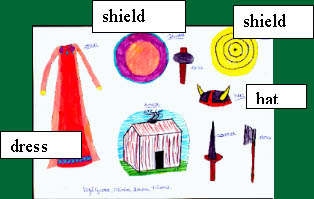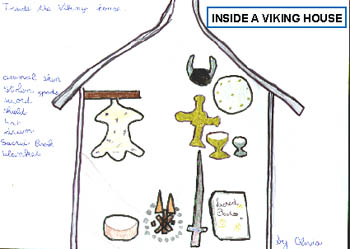THE
VIKINGS
The Vikings
first appeared on the coast of Ireland in the year 800. They came
from Denmark, Norway and Sweden.
The Chief was buried with his weapons and his jewels. Women wore long
dresses made of wool and a length of cloth over them. They dyed their
own clothes.
They made the best ships in that time. They were called longships.
They often swapped boys to learn crafts from other families. Their
towns were dirty and smelly. Poor people lived in little round huts.
Rich people lived in rectangular houses. The houses were made of wood.
They loved markets. They kidnapped people from other countries and
made them their slaves. The men wore tunics, shawls, broaches and
leather boots.
 |
 |
The Vikings roamed great distances. Merchants travelled to Russia,
Persia and around the Mediterranean Sea. They traded such northern
things as fur and walrus tusks for southern things such as silk and
silver. Story telling was very popular. These stories, or sagas, were
long poems telling of brave deeds, journeys to strange lands and victories
in battle. When people couldn't read or write, they remembered stories
by learning them off by heart. The Vikings, who called themselves
Ostmen, are famous in history for their fierce fighting and their
plundering.
A Viking ship was found buried in a ship grave in Norway. It is about
25 metres long and was built mostly of oak.
BY: Grace, Olivia, Niamh, Josephine, Laura.
THE VIKINGS
Long ago, Vikings came to Ireland. The Vikings came to Ireland to
steal the people's goods. The Vikings came to Ireland on their well-built
boats. They came from Scandinavia. Their gods were Odin (god of magic
and poems). Thor was (god of the sky) and Frey (god of fertility.)
Their houses were made of wood. The houses were rectangular shaped.
The poor people lived in round huts. The Vikings had a tiny hole at
the top of the house to let the smoke out of the fire. The women wore
fine clothing usually made from wool or linen. The people dyed their
clothes by using flowers. The Vikings had lots of armour such as swords,
axes and spears. They would wear tunics, cloaks and big coats.
At a funeral or a special occasion, the people killed an animal to
sacrifice to their gods. The Oserberg burial contained the finest
examples of Viking carving. This dragons head post was intended to
frighten away evil spirits. It is covered with nightmarish creatures
called gripping beasts, which often appear in Viking art. The Karls
were farmers, fishermen and craftsmen. Their armour was axes, swords,
hammers and shields. There were Viking boats found at Fagans tub.
BY: Amy, Anna, Alison Jenny, Siobhan, Julianne.
